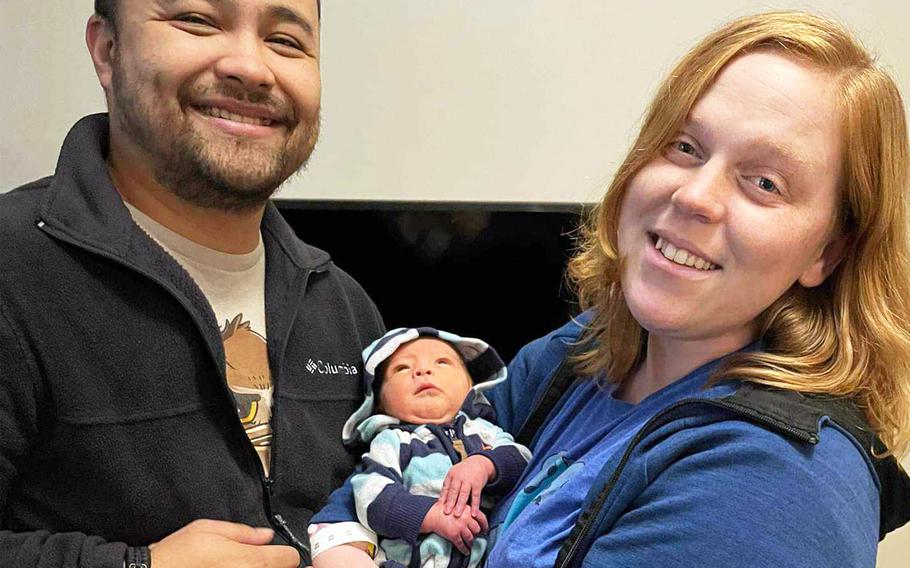
Petty Officer 2nd Class Dean Cates, a radio and video production supervisor for American Forces Network at Yokota Air Base in western Tokyo, and Petty Officer 2nd Class Aimee Ford, who works in public affairs for Naval Air Force Atlantic in Norfolk, Va., pose with their son, Lucas, in Virginia Beach in January 2023. (Dean Cates)
Troops who live apart from their family members will see a $150 increase in their separation pay this year due to changes in the National Defense Authorization Act.
The NDAA for fiscal year 2024, signed on Dec. 22 by President Joe Biden, includes an increase from $250 a month to $400 a month for the Family Separation Allowance.
Rep. Tony Gonzales, R-Texas, was among the congressional sponsors of an amendment to increase the allowance.
“#Results: Proud to have secured an increase in the Family Separation Allowance (FSA) this year,” he wrote Dec. 28 on X, formerly known as Twitter. “This is the first time the FSA has been raised in two decades — I’ll always stand with our military families.”
Petty Officer 2nd Class Dean Cates, a radio and video production supervisor for American Forces Network at Yokota Air Base in western Tokyo, has received $250 a month in separation pay for two years, he told Stars and Stripes on Wednesday via Facebook Messenger.
“I think the pay bump would give just a little more breathing room, but still not enough to be comfortable,” said the San Francisco native. “As it stands, a majority of my paychecks go toward supporting my family, often leaving me to essentially live like a broke college student.”
Cates’ wife, Petty Officer 2nd Class Aimee Ford, is stationed with Naval Air Force Atlantic in Norfolk, Va., and cares for their son, Lucas, who is almost a year old.
“Some positives about receiving separation pay is that it helps to supplement mortgage payments, childcare costs, an emergency fund and college fund,” Cates said.
“As a dual military marriage and as a geo-bachelor I’m not entitled to basic housing allowance, just overseas housing allowance, if I had elected to live off base,” he said. “However, in terms of financial responsibility, going that route, living off base, I feel would not have been financially responsible, especially with the removal of Overseas Cost-of-Living Allowance for service members in our area.”
To receive the Family Separation Allowance, service members must complete a DD Form 1561, Statement to Substantiate Payment of Family Separation Allowance, according to the Department of Defense official website.
Eligible service members are those involuntarily separated from their dependents, which includes troops whose dependents do not live at or near the member’s permanent duty station.
Other eligible service members include those aboard a ship away from its homeport, or who are under orders to remain aboard the ship at the homeport for more than 30 continuous days.
Service members on temporary duty away from their permanent duty stations for more than 30 continuous days, whose dependents do not live at or near the temporary duty station, are also eligible.